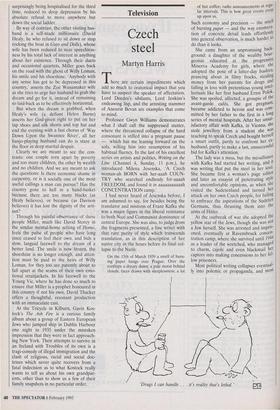Theatre
The Last Yankee (Young Vic) The Ash Fire (Tricycle)
On the borderline
Sheridan Morley
has been listening to the heartbeat of America and found it weakening. There has not been much doubt, since Death of a Salesman almost half a century ago, that here is our greatest living dramatist, nor that he is the most expert map-reader of the borderline where the American dream turns into its own worst nightmare. Now, to the Young Vic in London (and simultane- ously the Manhattan Theatre Club in New York) ork) comes his latest divination, The Last Yankee, a bleak 90-minute quartet set in a Connecticut state mental hospital. Two of the four players, the wives, are Patients there; the other two are their visit- ing husbands, one of them the last Yankee of the title, and the only other character is a mute, bedridden girl unable to lift even her head out of her depression. This is not, 'Y any standards, major Miller: but nor is it a,,.111inor late-life comedy like his last, The Ride Down Mount Morgan. Instead, it returns to many of the most important themes of his earlier and greater work, as if revisiting them, from the perspective of his three-score years and then some, to see if Ilanything very much has changed in the
cart and soul of his nation.
Not a lot, would seem to be the first con- clusion. Miller's America still contains the old patricians and the young pretenders, separated by economic and social and reli- gious divides. The title character (Peter Davison in fine, angular form) is a descen- dant of one of the founding families of the United States, who has however forsworn any inheritance of their wealth or status or influence to set up as a freelance carpenter, and give seven children to his anguished Wife (Zoe Wanamaker), who is not entirely
surprisingly being hospitalised for the third time, reduced to deep depression by his absolute refusal to move anywhere but down the social ladder.
By way of contrast, the other visiting hus- band is a self-made millionaire (David Healy, he who refused to sit down or stop rocking the boat in Guys and Dolls), whose wife has been reduced to near speechless- ness by his total lack of interest in anything about her existence. Through their duets and occasional quartets, Miller goes back on the road with the ghost of Willy Loman, his smile and his shoeshine: 'Anybody with any sense has got to be depressed in this country,' asserts the Zoe Wanamaker wife as she tries to urge her husband to grab the dream and go for it, instead of remaining so laid-back as to be effectively horizontal.
But when the dream is grabbed, when Healy's wife (a defiant Helen Burns) asserts her God-given right to put on her tap shoes and silk shorts and top hat and end the evening with a fast chorus of 'Way Down Upon the Swannee River', all her banjo-playing husband can do is stare at the floor in deep marital despair.
Clearly we are meant to see the con- trasts: one couple torn apart by poverty and too many children, the other by wealth and no children. And we are meant to ask the questions: Is there economic shame in carpentry, or is it socially one of the most useful callings a man can pursue? Has the country gone to hell in a hand-basket because there are too many blacks (as Healy believes), or because (as Davison believes) it has lost the dignity of the arti- san?
Through his painful observance of these people Miller, much like David Storey in the similar mental-home setting of Home, feels the pulse of people who have long since ceased to feel their own, and bids a slow, languid farewell to the dream of a better land. The smile is now frozen, the shoeshine is no longer enough, and atten- tion must be paid to the heirs of Willy Loman, for they too are patently about to fall apart at the seams of their own emo- tional straitjackets. In his farewell to the Young Vic, where he has done so much to ensure that Miller is a prophet honoured in this country if not his own, David Thacker offers a thoughtful, resonant production with an immaculate cast.
At the Tricycle in Kilburn, Gavin Kos- tock's The Ash Fire is a curious family album about a group of Eastern European Jews who jumped ship in Dublin Harbour one night in 1935 under the mistaken impression that they were in fact approach- ing New York. Their attempts to survive in an Ireland with Troubles of its own is a tragi-comedy of illegal immigration and the clash of religious, racial and social doc- trines which never quite recovers from a fatal indecision as to what Kostock really wants to tell us about his own grandpar- ents, other than to show us a few of their family snapshots in no particular order.























































 Previous page
Previous page